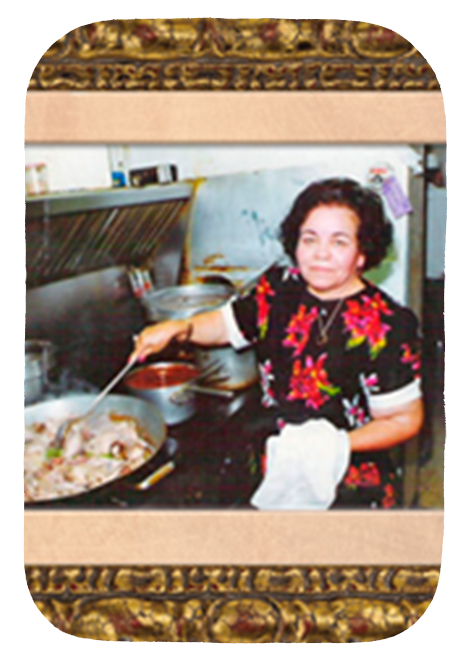Maria Cardenas,
Latina Business Owner and Community Gatherer
1924–2002
A “beloved wife, patient mother, doting grandmother, and creative business woman,” Maria Cardenas served as a pioneer for Latina entrepreneurs and spent her life finding joy in sharing her culture through her irresistible cooking.
Maria was born on March 24, 1922 in Chihuahua, Mexico, to Manuel and Luz Corral Quinonez. She learned to love cooking from a young age standing next to her mother and helping her prepare a variety of dishes. As she grew older, she co-ran a catering business. Likely seeking greater economic opportunity, Cardenas moved to the United States in 1953. Four years later she married Ramon Cardenas, who shared her love of cooking. They ran their first restaurant business in San Francisco until Ramon’s relatives in Salt Lake City encouraged the couple to move to Utah in 1966.
 Eager to continue to share their love for their heritage and cultural dishes, the Cardenas first opened up Casa Grande. Maria cooked while Ramon waited on customers. According to Ramon, “It was tough making a living at first, because most people around here didn’t know much about Mexican food in those days. There were only three Mexican restaurants, and there weren’t very many immigrants either.” The Cardenas encountered another obstacle when their restaurant burned down, forcing them to relocate. They eventually chose a run-down building on North Temple for their new location and turned it into a “modest Mexican cantina,” calling it “Red Iguana: Home of Killer Mexican Food.” The restaurant soon became very popular, attracting a “cult-like following,” attracting customers from across the country who were willing to wait for 50 minutes for a bite of Maria’s specialty dishes.
Eager to continue to share their love for their heritage and cultural dishes, the Cardenas first opened up Casa Grande. Maria cooked while Ramon waited on customers. According to Ramon, “It was tough making a living at first, because most people around here didn’t know much about Mexican food in those days. There were only three Mexican restaurants, and there weren’t very many immigrants either.” The Cardenas encountered another obstacle when their restaurant burned down, forcing them to relocate. They eventually chose a run-down building on North Temple for their new location and turned it into a “modest Mexican cantina,” calling it “Red Iguana: Home of Killer Mexican Food.” The restaurant soon became very popular, attracting a “cult-like following,” attracting customers from across the country who were willing to wait for 50 minutes for a bite of Maria’s specialty dishes.
Maria found meaning and joy in preparing various dishes and sought in particular to expose people to the variety of Mexican food beyond the typical menu of tacos and enchiladas, serving gourmet dishes like ceviche and pollo pibil (chicken wrapped in banana leaves). A journalist for the Salt Lake Tribune wrote, “Mrs. Cardenas delights in heading for the kitchen, tying on her apron and preparing the kind of elegant Mexican cuisine […] To see what Mrs. Cardenas had prepared was to know a culinary artist had been at work.”
Maria also became involved in the Mexican American community in Salt Lake City, including serving as president of the Mexican Patriotic Committee of Salt Lake City, which threw annual celebrations of Mexico’s independence and inspired a sense of cultural pride.
When she wasn’t busy whipping up dishes in the restaurant, Maria used her creativity to create stained glass, embroider, and sew baby clothes for friends and relatives. Her children recounted fond memories of dancing and singing with her.
Maria passed away in 2002, but her legacy remains alive and well in Red Iguana, where her children continue to serve delicious Mexican food today.


